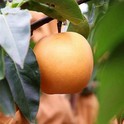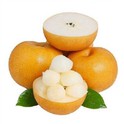Hey there! I'm an organic pear supplier, and I've been in love with growing these delicious fruits for years. One of the most common questions I get from other growers and even consumers is, "How do I fertilize organic pear trees naturally?" Well, I'm here to share my experiences and tips on this very topic.
First off, let's talk about why natural fertilization is so important. When you use natural fertilizers, you're not only providing essential nutrients to your pear trees but also improving the soil quality. This, in turn, helps the trees develop strong root systems, resist diseases, and produce better - tasting pears. And as an organic pear supplier, I know that the quality of our pears is directly related to how we take care of the trees.
Compost: The All - in - One Solution
Compost is like gold for organic pear trees. It's rich in organic matter, which breaks down slowly and releases nutrients over time. You can make your own compost at home using kitchen scraps, yard waste, and manure. Just pile them up in a corner of your garden, turn it every once in a while, and let nature do its thing.
Once your compost is ready, spread a layer around the base of your pear trees. Make sure not to pile it up against the trunk, as this can cause rot. A good rule of thumb is to spread about 2 - 3 inches of compost in a circle that extends a few feet beyond the drip line of the tree. The drip line is the area directly below the outermost branches.
Compost not only provides nutrients like nitrogen, phosphorus, and potassium but also improves the soil's structure. It helps the soil hold onto water better, which is crucial, especially during dry spells. And it encourages beneficial microorganisms in the soil, which can help protect the tree from pests and diseases.
Manure: A Time - Tested Fertilizer
Manure is another great natural fertilizer for organic pear trees. Cow, horse, and chicken manure are all good options, but they need to be aged or composted first. Fresh manure can be too strong and may burn the roots of the tree.
Aged manure is rich in nitrogen, which is essential for the growth of leaves and branches. It also contains other nutrients like calcium and magnesium. You can spread aged manure around the base of the tree in the same way as compost. Just like with compost, keep it a few inches away from the trunk.
If you're using chicken manure, be careful not to over - apply it. Chicken manure is very high in nitrogen, and too much can lead to excessive vegetative growth at the expense of fruit production. A light application once or twice a year should be sufficient.
Cover Crops: A Natural Way to Improve Soil
Cover crops are plants that you grow between the rows of your pear trees or in the area around the base of the tree. They help prevent soil erosion, suppress weeds, and add nutrients to the soil.
Some good cover crops for pear trees include clover, vetch, and rye grass. Clover, for example, is a legume that can fix nitrogen from the air and make it available to the pear tree. When the cover crop dies back or is tilled into the soil, it adds organic matter and nutrients.
You can plant cover crops in the fall or spring. In the fall, they can protect the soil over the winter, and in the spring, they can be tilled under before the pear tree starts to actively grow. This way, the nutrients from the cover crop are released into the soil just in time for the tree to use them.
Seaweed and Fish Emulsions: Liquid Gold
Seaweed and fish emulsions are liquid fertilizers that can be sprayed on the leaves of the pear tree or applied to the soil. They are rich in trace minerals and growth hormones that can help the tree grow stronger and produce more fruit.
Seaweed emulsion contains cytokinins, which are plant hormones that promote cell division and growth. It also has other beneficial compounds like alginates, which can help the tree absorb nutrients more efficiently. Fish emulsion, on the other hand, is high in nitrogen and other nutrients.
You can find seaweed and fish emulsions at your local garden center. Dilute them according to the instructions on the label and apply them every few weeks during the growing season. Foliar spraying (spraying on the leaves) can be especially effective, as the tree can absorb the nutrients directly through the leaves.
Rock Dust: A Slow - Release Fertilizer
Rock dust is a natural fertilizer made from crushed rocks. It contains a wide range of minerals like calcium, magnesium, potassium, and trace elements. These minerals are released slowly into the soil over time, providing a long - term source of nutrients for the pear tree.
You can spread rock dust around the base of the tree in the spring or fall. It's a good idea to mix it with compost or manure before applying it to the soil. This helps the rock dust break down more quickly and ensures that the nutrients are evenly distributed.
My Personal Experience with Organic Fertilization
I've been growing organic pears for over a decade now, and I've seen firsthand the benefits of natural fertilization. My pear trees are healthier, more resistant to diseases, and produce some of the sweetest and juiciest pears you'll ever taste.
I remember one year when I had a particularly bad drought. The trees that were fertilized with compost and cover crops were able to withstand the dry conditions much better than the ones that weren't. They had deeper root systems and were able to access water from deeper in the soil.
And the taste of the pears! Using natural fertilizers really makes a difference. The pears have a more intense flavor and a better texture. I've had customers tell me that my Nansui Pear, Fresh Pear, and Autumn Moon Pear are the best they've ever had.


Conclusion and Call to Action
Fertilizing organic pear trees naturally is not only good for the environment but also for the health and productivity of your trees. By using compost, manure, cover crops, seaweed and fish emulsions, and rock dust, you can provide your pear trees with the nutrients they need without relying on synthetic chemicals.
If you're interested in purchasing our high - quality organic pears, whether it's for your family or your business, I'd love to hear from you. We're always looking for new partners and customers. Just reach out, and we can start a conversation about your needs.
References
- "The Organic Gardener's Handbook of Natural Insect and Disease Control" by Barbara W. Ellis and Fern Marshall Bradley
- "Teaming with Microbes: The Organic Gardener's Guide to the Soil Food Web" by Jeff Lowenfels and Wayne Lewis






